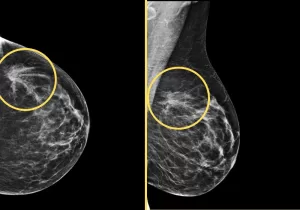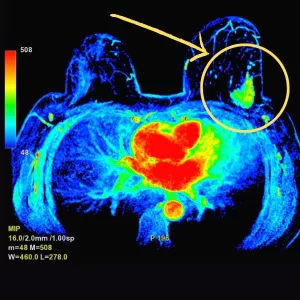Is there a way to detect breast cancer early on?
We’ve never had better technology to study breast cancer than we do today. We have mammograms, MRIs, ultrasounds, and tomosynthesis so that we can depict every aspect of breast tumors.
However, these techniques are useless if we can’t detect tumors early, as we cannot run mammograms on every woman every year. Women need to know what breast cancer looks like so they get an early diagnosis and treatment.
Breast cancer looks different in each person. Some people have no signs at all, especially in the early stages. The tumor is too small to be felt. The opposite is true, too. Some women feel lumps in their breasts, and they turn out not to be cancer. Fibroadenomas and cysts look like lumps as well.
When there are signs, the most common are:
i. lumps
ii. thick skin
iii. change in size
iv. dimples
v. nipple gets retracted
vi. secretion through nipple
vii. cracked nipple
viii. red and hot breast
ix. orange skin
x. skin sores
The Main Signs Of Breast Cancer
1. A lump
This is the most common sign of breast cancer. A lump that feels hard, irregular, attached to the skin, is likely to be cancer.
Some lumps are benign, though. Cysts and fibroadenomas feel like lumps, too. However, they are more rounded, softer and the margins are smoother. You can move them–they are not attached to the skin or the muscle.
If you find a new lump on your breast, go to your doctor. They will run some tests that will discriminate better whether it’s cancer or not. The first tests are usually mammograms and ultrasound, and in many cases, that’s enough to get a first good idea.

2. A thick area on the skin of your breast
If the skin of your breast gets thick, look for the reason. Sometimes, there is a tumor growing close to the surface. If it contacts with the skin, it may turn the skin fibrotic, which feels thicker when you touch it.
3. Dimples or bumps
Superficial tumors can also abut your skin, causing a bump. Some tumors may have the opposite effect, though, and cause dimples on your skin. Fibrotic tumors tend to retract the tissues around them, causing dimples.
4. Skin sores
Another manifestation of superficial tumors are skin sores. They happen when the tumor erodes the skin overlying it.
5. Retracted nipple
If the retraction is close to your nipple it may get inverted. Instead of pointing out, your nipple will be looking inward.
6. Change in size or shape
Bulky tumors can make your breast look bigger, or grow an unusual shape. If one of your breast starts growing more than the other, check with your doctor.
7. Secretion of nipple
Tumors that are near the nipple can erode milk ducts. As a result, you’ll get secretion out of your nipple. It can be yellowish, white-ish or have some blood in it.
8. Cracked nipple
Tumors near the nipple can cause a crush or peeling. Take a closer look. Is it irritation because it’s rubbing agains your clothes? If it doesn’t go away after a few days, check with your doctor.
9. Red and hot breast
There is a special type of breast cancer that looks like an inflammation of the breast. Not surprisingly, we call it inflammatory breast cancer.
Your breast gets hot, red and you may even get a rash. It can also hurt. It’s a deceiving presentation. However, if an “infection” doesn’t improve after taking antibiotics, it’s time to consider this kind of cancer.
10. Orange skin
Another strange presentation of inflammatory cancer. The skin on your breast gets and orange appearance, with the same color and texture.
What to do if you have these signs
If you have any new findings in your breasts, you need to go to the doctor. Then, they will order the most useful tests, which in the beginning are a mammogram and an ultrasound.
If these are not enough, you may need more tests such as an MRI, a breast tomosynthesis or a biopsy. All these tests are very accurate in discerning breast cancer from benign lesions.


Leave a Reply